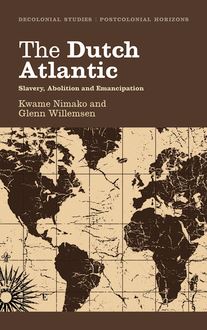The Dutch Atlantic , livre ebook
159
pages
English
Ebooks
2011
Vous pourrez modifier la taille du texte de cet ouvrage
Obtenez un accès à la bibliothèque pour le consulter en ligne En savoir plus
Découvre YouScribe en t'inscrivant gratuitement
Découvre YouScribe en t'inscrivant gratuitement
159
pages
English
Ebooks
2011
Vous pourrez modifier la taille du texte de cet ouvrage
Obtenez un accès à la bibliothèque pour le consulter en ligne En savoir plus
Publié par
Date de parution
12 septembre 2011
Nombre de lectures
1
EAN13
9781783714834
Langue
English
Kwame Nimako and Glenn Willemsen show how the slave trade and slavery intertwined economic, social and cultural elements, including nation-state formation in the Netherlands and across Europe. They explore the mobilisation of European populations in the implementation of policies that facilitated Atlantic slavery and examine how European countries created and expanded laws that perpetuated colonisation.
Addressing key themes such as the incorporation of the formerly enslaved into post-slavery states and contemporary collective efforts to forget and/or remember slavery and its legacy in the Netherlands, this is an essential text for students of European history and postcolonial studies.
Acknowledgements
Foreword
Stephen Small, UC Berkeley
Preface
Artwell Cain, NiNsee
1. Introduction, Goals and Issues
Introduction and Goals
Context and Concepts
Importance and Relevance
Overview of Chapters
2. Transatlantic Slavery and the Rise of the European
World Order
The Age of Banditry (1492–1648)
Sovereignty and Chattel Slavery (1648–1789)
Citizenship, Slavery and the ‘Free Soil Ideology’
Science and Chattel Slavery
3. Chattel Slavery, Sugar and Salt
Slavery and the Making of Global Economy
Slavery and Sugar
Sugar and Suriname
Pacification and Resistance
4. Abolition without Emancipation
European and Systemic Context
From Regulation to Intervention
Modalities of Abolition: Progressive Control versus
Transformative Change
Abolition and Citizenship
5. Trajectories of Emancipation: Religion, Class,
Gender and Race
Religion and Emancipation
Class and Emancipation
viii The Dutch Atlantic
Gender and Emancipation
Race and Emancipation
The Immediate Aftermath of Abolition
6. The Legacy of Slavery: The Unfinished Business of
Emancipation
Memory and Dignitarianism
Commemorators and Commemoration
Integration and Multiculturalism
NiNsee as a Contested Project
Museums and Galleries
Reparations
Anniversaries and Apologies
7. Conclusion: Parallel Histories and Intertwined
Belonging
Some Conclusions
A Final Note
Bibliography
Index
Publié par
Date de parution
12 septembre 2011
Nombre de lectures
1
EAN13
9781783714834
Langue
English
The Dutch Atlantic
Decolonial Studies, Postcolonial Horizons
Series editors: Ramon Grosfoguel (University of California at Berkeley), Barnor Hesse (Northwestern University) and S. Sayyid (University of Leeds)
Since the end of the Cold War, unresolved conjunctures and crises of race, ethnicity, religion, diversity, diaspora, globalization, the West and the non-West, have radically projected the meaning of the political and the cultural beyond the traditional verities of Left and Right. Throughout this period, Western developments in ‘international relations’ have become increasingly defined as corollaries to national ‘race relations’ across both the European Union and the United States, where the reformation of Western imperial discourses and practices have been given particular impetus by the ‘war against terror’. At the same time hegemonic Western continuities of racial profiling and colonial innovations have attested to the incomplete and interrupted institutions of the postcolonial era. Today we are witnessing renewed critiques of these postcolonial horizons at the threshold of attempts to inaugurate the political and cultural forms that decolonization now needs to take within and between the West and the ‘non-West’. This series explores and discusses radical ideas that open up and advance understandings of these politically multicultural issues and theoretically interdisciplinary questions.
Also available
Rewriting Exodus American Futures from Du Bois to Obama Anna Hartnell
Islam and the Political Theory, Governance and International Relations Amr G.E. Sabet
THE DUTCH ATLANTIC
Slavery, Abolition and Emancipation
Kwame Nimako and Glenn Willemsen
First published 2011 by Pluto Press 345 Archway Road, London N6 5AA
www.plutobooks.com
Distributed in the United States of America exclusively by Palgrave Macmillan, a division of St Martin’s Press LLC, 175 Fifth Avenue, New York, NY 10010
Copyright © Kwame Nimako and Glenn Willemsen 2011
The right of Kwame Nimako and Glenn Willemsen to be identified as the authors of this work has been asserted by them in accordance with the Copyright, Designs and Patents Act 1988.
British Library Cataloguing in Publication Data A catalogue record for this book is available from the British Library
ISBN 978 0 7453 3108 9 Hardback ISBN 978 0 7453 3107 2 Paperback ISBN 978 1 8496 4615 4 PDF eBook ISBN 978 1 7837 1484 1 Kindle eBook ISBN 978 1 7837 1483 4 EPUB eBook
Library of Congress Cataloging in Publication Data applied for
This book is printed on paper suitable for recycling and made from fully managed and sustained forest sources. Logging, pulping and manufacturing processes are expected to conform to the environmental standards of the country of origin.
10 9 8 7 6 5 4 3 2 1
Published with the assistance of NiNsee
Designed and produced for Pluto Press by Chase Publishing Services Ltd Typeset from disk by Stanford DTP Services, Northampton, England Simultaneously printed digitally by CPI Antony Rowe, Chippenham, UK and Edwards Bros in the United States of America
In loving memory of Glenn Frank Walther Willemsen (1948–2008)
Contents
Acknowledgements Foreword Stephen Small, UC Berkeley Preface Artwell Cain, NiNsee
1
Introduction, Goals and Issues
Introduction and Goals
Context and Concepts
Importance and Relevance
Overview of Chapters
2
Transatlantic Slavery and the Rise of the European World Order
The Age of Banditry (1492–1648)
Sovereignty and Chattel Slavery (1648–1789)
Citizenship, Slavery and the ‘Free Soil Ideology’
Science and Chattel Slavery
3
Chattel Slavery, Sugar and Salt
Slavery and the Making of Global Economy
Slavery and Sugar
Sugar and Suriname
Pacification and Resistance
4
Abolition without Emancipation
European and Systemic Context
From Regulation to Intervention
Modalities of Abolition: Progressive Control versus Transformative Change
Abolition and Citizenship
5
Trajectories of Emancipation: Religion, Class, Gender and Race
Religion and Emancipation
Class and Emancipation
Gender and Emancipation
Race and Emancipation
The Immediate Aftermath of Abolition
6
The Legacy of Slavery: The Unfinished Business of Emancipation
Memory and Dignitarianism
Commemorators and Commemoration
Integration and Multiculturalism
NiNsee as a Contested Project
Museums and Galleries
Reparations
Anniversaries and Apologies
7
Conclusion: Parallel Histories and Intertwined Belonging
Some Conclusions
A Final Note
Bibliography Index
Acknowledgements
The word ‘debt’ has different meaning in different settings. In the world of economics, finance and money, being in debt to a person or institution is an indication that you are in deep trouble; it means the person or institution you are indebted to has some power or control over you. However in other social relations and settings, being indebted reflects an appreciation of the humanity and generosity of others to you. It is in the latter context that I wish to express my indebtedness to the following people.
Let me begin by thanking Carla Willemsen-de Vries and Tamira Willemsen, the wife and daughter respectively of the late Glenn Willemsen, for allowing me to continue a project Glenn and I initiated before he passed away. They know that, after more than 25 years of close friendship and collaboration with Glenn, I was well placed to continue this project on his behalf. Carla and Tamira entrusted me with this work in Glenn’s name in the belief that I would do justice to him. I hope I have not disappointed them.
I discussed this project with Eddy Campbell, then interim director of NiNsee, in August 2008. To facilitate its realization, he agreed to support it, giving me access to NiNsee’s facilities and covering part of the cost. His successor, and the current director of NiNsee, Artwell Cain, gave his full backing when he assumed office in 2009. As friend and colleague, Artwell has consistently offered invaluable support. Ronny Rens, the office manager at NiNsee, and Denice Soekra, the executive secretary, gave me the necessary administrative support to facilitate my work. I discussed the project with Frank Dragtenstein and Humphrey Lamur in NiNsee corridors whenever the opportunity arose. My conversations with Cees Luckhardt enriched my understanding of salt production on Bonaire in the Dutch Antilles.
I would like thank a number of institutions and organizations which Glenn and I visited, either together or separately, for the opportunities they gave us to make presentations about material related to this book and for the feedback and comments received from panel respondents and audiences. These institutions include: the Center for Global Studies and the Humanities, Duke University; the Institute for Postcolonial and Transcultural Studies, University of Bremen; the Gilder Lehrman Center for the Study of Slavery, Resistance and Abolition, Yale University; the Wilberforce Institute for the Study of Slavery and Emancipation, University of Hull; the Department of African American Studies, University of California, Berkeley; Northwestern University; Maison des Sciences de l’Homme (MSH), Paris; and finally the NiNsee Symposia on Trajectories of Emancipation, which I have helped to organize.
Interactions with old and new friends and colleagues were invaluable in helping me develop my thoughts about a number of issues. Among them are: Robert Allen, Harald Axwijk, Dew Baboeram, Bill Banks, Hilary Beckles, Dalida Maria Benfield, Allison Blakely, Sabine Broeck, Jean Casimir, Michaeline Crichlow, Carlos Erselina, Philomena Essed, David Theo Goldberg, Lewis Gordon, Jane Gordon, Ramon Grosfoguel, Marina Grzinic, Enrique Dussel, Hardy Frye, Darlene Clark Hine, Charles Henry, the late Andre Gunder Frank, Dienke Hondius, Gerd Junne, Susan Legêne, Trica Keaton, Kamala Kempadoo, Abdul JanMohamed, Eric Mielants, Walter Mignolo, Claudia Milian, Chris Mullard, Tiffany Ruby Patterson, Mark Sawyer, Madina Tlostanova, Nelson Maldonado-Torres, Catherine Walsh, Gloria Wekker, T. Sharpley-Whiting, and Donna Driver-Zwartkruis.
My visits to the Liverpool International Slavery Museum, the London Docklands Museum, and the Museum of the African Diaspora in San Francisco gave me additional motivation to complete this project.
Eric Mielants prepared an English translation of Glenn Willemsen’s book Dagen van gejuich en gejubel ( Days of Exultation and Jubilation ) (2006a), making it easier for me to integrate some material from the earlier book into the present one. Artwell Cain, Trica Keaton and Walter Mignolo read an early draft of the book and gave me useful tips and valuable feedback.
I am grateful to Ramon Grosfoguel, Salman Sayyid and Barnor Hesse for inviting me to submit the manuscript for the Decolonial Studies and Postcolonial Horizons Series published by Pluto Press. David Castle, the commissioning editor at Pluto Press, has been very flexible, patient and supportive. I also thank the three Pluto anonymous reviewers; they asked tough questions, which forced me to confront important issues.
As usual, my friend and colleague, Amy Abdou, my ‘boss’ as I affectionately call her, has stood by me all along. Her efficiency is outstanding. She is my first call for edits and feedback; during the past three years I have hardly finished any major work without seeking her opinion.
I cannot thank my friend and colleague Stephen Small enough. He knows this book from A to Z; he read all the draft chapters and the whole manuscript along the way and consistently gave me valuable feedback. This is reflected in his foreword.
I take this opportunity of thanking all these people and institutions; but that is not to suggest that any shortcomings in this book can be attributed to them.
Kwame Nimako April 2011
Foreword
Stephen Small
At the start of the twenty-first century, those of us trying to tackle the enormit







